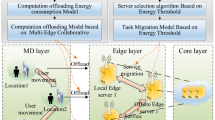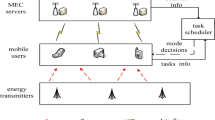Abstract
In mobile edge computing systems, the energy consumption and execution delay can be reduced dramatically by mobile edge computation offloading (MECO) . However, due to the limited computing capacity of edge cloud, an energy-efficient offloading strategy plays a significant role. In this paper, the offloading decision problem for multi-device edge computing systems based on time-division multiple access is studied. The scheduling of offloading devices at the edge cloud is considered when modelling the edge computing system. Then, the offloading decision problem is formulated as an energy consumption minimization problem with the constraint of latency tolerance. It is a mixed integer programming problem of NP-hardness. To address the problem, a Dynamic Programming-based Energy Saving Offloading (DPESO) algorithm is designed to obtain the offloading strategy including the offloading option, offloading sequence and transmission power. First, the MECO with infinite edge cloud capacity is solved by device classification and transmission power decision. Then, we sort and adjust the offloading devices to meet the latency tolerance for the MECO with finite edge cloud capacity. Finally, simulation results demonstrate that the DPESO algorithm achieves better energy efficiency than the baseline strategies and has good scalability.








Similar content being viewed by others
Notes
Although we assume a TDMA scenario, our analysis can be extended into other access schemes with a minor modification on the framework.
References
Mung, C., & Zhang, T. (2016). Fog and IoT: An overview of research opportunities. IEEE Internet of Things Journal, 3(6), 854–864.
Osanaiye, O., Chen, S., Yan, Z., Lu, R., Choo, K.-K. R., & Dlodlo, M. (2017). From cloud to fog computing: A review and a conceptual live VM migration framework. IEEE Access, 5, 8284–8300. https://doi.org/10.1109/ACCESS.2017.2692960.
Shi, W., Cao, J., Zhang, Q., Li, Y., & Xu, L. (2016). Edge computing: Vision and challenges. IEEE Internet of Things Journal, 3(5), 637–646.
Sun, X., & Ansari, N. (2016). EdgeIoT: Mobile edge computing for the Internet of Things. IEEE Communications Magazine, 54(12), 22–29.
Mach, P., & Becvar, Z. (2017). Mobile edge computing: A survey on architecture and computation offloading. IEEE Communications Surveys & Tutorials, 19(3), 1628–1656.
Liu, F., Huang, Z., & Wang, L. (2019). Energy-efficient collaborative task computation offloading in cloud-assisted edge computing for IoT sensors. Sensors (Basel), 19(5), 1105.
You, C., Huang, K., Chae, H., & Kim, B. H. (2017). Energy-efficient resource allocation for mobile-edge computation offloading. IEEE Transactions on Wireless Communications, 16(3), 1397–1411.
Liu, M., & Liu, Y. (2018). Price-based distributed offloading for mobile-edge computing with computation capacity constraints. IEEE Wireless Communications Letters, 7(3), 420–423. https://doi.org/10.1109/lwc.2017.2780128.
Kumar, K., Liu, J., Lu, Y.-H., & Bhargava, B. (2012). A survey of computation offloading for mobile systems. Mobile Networks and Applications, 18(1), 129–140.
Liu, H., Eldarrat, F., Alqahtani, H., Reznik, A., de Foy, X., & Zhang, Y., (2018). Mobile edge cloud system: Architectures, challenges, and approaches. IEEE Systems Journal, 12(3), 2495–2508.
Wang, S., Zhang, X., Zhang, Y., Wang, L., Yang, J., & Wang, W. (2017). A survey on mobile edge networks: convergence of computing, caching and communications. IEEE Access, 5, 6757–6779.
Ceselli, A., Premoli, M., & Secci, S. (2017). Mobile edge cloud network design optimization. IEEE/ACM Transactions on Networking, 25(3), 1818–1831. https://doi.org/10.1109/tnet.2017.2652850.
Mao, Y., Zhang, J., & Letaief, K. (2016). Dynamic computation offloading for mobile-edge computing with energy harvesting devices. IEEE Journal on Selected Areas in Communications, 34(12), 3590–3605.
You, C., Huang, K., & Chae, H. (2016). Energy efficient mobile cloud computing powered by wireless energy transfer. IEEE Journal on Selected Areas in Communications, 34(5), 1757–1771. https://doi.org/10.1109/jsac.2016.2545382.
Xiang, X., Lin, C., & Chen, X. (2014). Energy-efficient link selection and transmission scheduling in mobile cloud computing. IEEE Wireless Communications Letters, 3(2), 153–156.
Zhang, W., Wen, Y., Guan, K., Kilper, D., Luo, H., & Wu, D. (2013). Energy-optimal mobile cloud computing under stochastic wireless channel. IEEE Transactions on Wireless Communications, 12(9), 4569–4581.
Du, J., Zhao, L., Feng, J., & Chu, X. (2018). Computation offloading and resource allocation in mixed fog/cloud computing systems with min–max fairness guarantee. IEEE Transactions on Communications, 66(4), 1594–1608.
Guo, S., Liu, J., Yang, Y., Xiao, B., & Li, Z. (2019). Energy-efficient dynamic computation offloading and cooperative task scheduling in mobile cloud computing. IEEE Transactions on Mobile Computing, 18(2), 319–333.
Yang, L., Cao, J., Cheng, H., & Ji, Y. (2015). Multi-user computation partitioning for latency sensitive mobile cloud applications. IEEE Transactions on Computers, 64(8), 2253–2266.
Chen, X., Jiao, L., Li, W., & Fu, X. (2016). Efficient multi-user computation offloading for mobile-edge cloud computing. IEEE/ACM Transactions on Networking, 24(5), 2795–2808.
Zhang, J., Hu, X., Ning, Z., Ngai, E., Zhou, L., Wei, J., et al. (2018). Energy-latency tradeoff for energy-aware offloading in mobile edge computing networks. IEEE Internet of Things Journal, 5(4), 2633–2645.
Dinh, T. Q., Tang, J., La, Q. D., & Quek, T. Q. S. (2017). Offloading in mobile edge computing: Task allocation and computational frequency scaling. IEEE Transactions on Communications, 65(8), 3571–3584.
Hao, Y., Chen, M., Hu, L., Hossain, M. S., & Ghoniem, A. (2018). Energy efficient task caching and offloading for mobile edge computing. IEEE Access, 6, 11365–11373.
Ren, J., Yu, G., Ca, Y., & He, Y. (2018). Latency optimization for resource allocation in mobile-edge computation offloading. IEEE Transactions on Wireless Communications, 17(8), 5506–5519.
Wang, Y., Sheng, M., Wang, X., Wang, L., & Li, J. (2016). Mobile-edge computing: Partial computation offloading using dynamic voltage scaling. IEEE Transactions on Communications, 64(10), 4268–4282.
Zhang, K., Mao, Y., Leng, S., Zhao, Q., Li, L., Peng, X., et al. (2016). Energy-efficient offloading for mobile edge computing in 5G heterogeneous networks. IEEE Access, 4, 5896–5907.
Xiao, M., Lin, C., Han, Z., & Liu, J. (2018). Energy-aware computation offloading of IoT sensors in cloudlet-based mobile edge computing. Sensors, 18(6), 1945.
Flores, H., Hui, P., Tarkoma, S., Li, Y., Srirama, S., & Buyya, R. (2015). Mobile code offloading: From concept to practice and beyond. IEEE Communications Magazine, 53(3), 80–88. https://doi.org/10.1109/MCOM.2015.7060486.
Sophia, A. (2016). ETSI mobile edge computing publishes foundation specifications [EB/OL]. Retrieved from July 18, 2020 from http://www.etsi.org/index.php/news-events/news/1078-2016-04-etsi-mobile-edge-computing-publishes-foundation-specifications.
Joseph, A. D., deLespinasse, A. F., Tauber, J. A., Gifford, D. K., & Kaashoek, M. F. (1995). Rover: A toolkit for mobile information access. ACM SIGOPS Operating Systems Review, 29(5), 156–171. https://doi.org/10.1145/224057.224069.
Kosta, S., Aucinas, A., Hui, P., Mortier, R., & Zhang, X. (2012). ThinkAir: Dynamic resource allocation and parallel execution in the cloud for mobile code offloading. In Proceedings IEEE Infocom (pp. 945–953).
Burd, T. D., & Brodersen, R. W. (1996). Processor design for portable systems. Journal of VLSI Signal Processing Systems for Signal Image & Video Technology, 13(2–3), 203–221.
Shannon, C. E. (1948). A mathematical theory of communication. Bell System Technical Journal, 27, 329–423.
Labbé, M., Laporte, G., & Martello, S. (2003). Upper bounds and algorithms for the maximum cardinality bin packing problem. European Journal of Operational Research, 149(3), 490–498.
Johnson, S. M. (2006). Optimal two- and three-stage production schedules with setup times included. Naval Research Logistics Quarterly, 1(1), 61–68.
Sarkar, T. K., Burintramart, S., Yilmazer, N., Hwang, S., Zhang, Y., De, A., et al. (2006). A discussion about some of the principles/practices of wireless communication under a Maxwellian framework. IEEE Transactions on Antennas and Propagation, 54(12), 3727–3745. https://doi.org/10.1109/TAP.2006.886522.
Author information
Authors and Affiliations
Corresponding author
Ethics declarations
Conflict of interest
The authors declare that they have no conflict of interest.
Additional information
Publisher's Note
Springer Nature remains neutral with regard to jurisdictional claims in published maps and institutional affiliations.
Rights and permissions
About this article
Cite this article
Zhang, Y., Fu, J. Energy-efficient computation offloading strategy with tasks scheduling in edge computing. Wireless Netw 27, 609–620 (2021). https://doi.org/10.1007/s11276-020-02474-1
Accepted:
Published:
Issue Date:
DOI: https://doi.org/10.1007/s11276-020-02474-1




